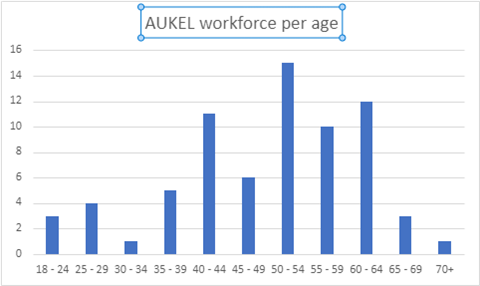Older Workers Week and Ageism
Published on 29 November 2023 06:01 PM
Hi! My name is Elliott, I’ve been the Communications Officer at Age UK East London for almost 18 months.
As the Comms Officer I help to tell our story as an organisation and make sure that the voices older East Londoners are heard.
If you would like to get in touch you can email me at elliott.hills@ageukeastlondon.org.uk.
Last week we marked ‘Older Workers Week’ and it got me thinking about what a great, diverse and multigenerational team we have at AUKEL. It took the awareness week for me to… be aware of it because it is not something that necessarily sticks out at you. Our team works seamlessly together and contains people of different generations and age groups. For instance, I am 29, we have people as young as 24 in our organisation, and as old as 74. Having a multigenerational team really allows us to support our clients in the best ways possible. I started looking up the other benefits of multigenerational teams and found that there are many, but I also found out that multigenerational teams are not necessarily the norm and many older people who wish to be in work find it difficult to gain employment. I did some research as to why this might be.

An important factor in this question is ageism. This is something many people are vaguely aware of, but few have really investigated it deeply. What does it mean? And what are its effects and outcomes? I turned to the Centre for Ageing Better and their brilliant report 'Ageism. What’s the Harm?' and finished reading much the wiser about this important aspect of our society. I’ve included some findings from the report below, but if you are interested and would like to read the full report, you can do so here.
What is Ageism?
Ageism is an often-overlooked form of discrimination that can cause real harm to people, the economy and society as a whole. It involves excluding older people from taking part in certain institutions, being involved in society, or accessing services. Ageism restricts older people’s potential and can ultimately damage health and wellbeing.
In the UK today, ageism is embedded in our society. Older people are routinely devalued and marginalised which causes divisions and exacerbates inequalities. In their report on ageism, the Centre for Ageing Better explain that in the UK, one-in-three people have experienced prejudice or age discrimination. Furthermore, a study of the use of language relating to older age in web-based magazines and newspapers found that of 20 countries, the UK was the most ageist.
Types of Ageism
Ageism can take many forms but is often spoken about in three categories:
Institutional: when ageism is embedded in laws, rules, social norms, policies and the practices of institutions.
Interpersonal: When ageism occurs in the interactions between individuals
Self Directed: When a person internalises ageism due to repeated exposure to age-based biases and, as a result, modifies their own thinking or behaviour.
Ageism as Discrimination
Ageism intersects with other forms of discrimination, including racism, sexism and ableism. This relationship can magnify the negative effects that these types of discrimination can have on someone’s life. Just like religion or gender, age is one of the nine characteristics that are protected under the Equalities Act. However, ageism is often not called out in society and remains a more insidious form of discrimination.
As is the case in many forms of discrimination, ageism results in people being defined by harmful or inaccurate stereotypes which segregate them from the rest of society. This can have significant negative effects on people’s lives, their prospects, futures, and happiness.
Our Ageing Society
It is becoming more widely known and understood that our population in the UK is ‘ageing’. There are currently more than 10 million people aged 65 and over in England which accounts for almost 19% of the population. This is the highest proportion of the population that this ade group has ever been.
Whilst many decision makers express fear at this fact, decrying its effect on the economy, it is actually ageism, rather than ageing, that is harming our society. An example of this is the fact that there are over 1,000,000 job vacancies in the UK today and some 800,000 people aged between 50-64 who wish to return to the workforce. Studies have shown huge disparities in employment chances between older and younger people when using identical CV’s.
Beyond the benefits for the economy, having multigenerational teams has been shown to be great for business too: “Businesses with a higher share of workers over 50 are more productive and companies with a multigenerational workforce have been found to be more innovative than those without.” (Ageism: What’s the harm? p.25)
Far from being a burden on the economy, older people actually do a huge amount of unrecognised work that supports the economy. According to the report 1-5 people aged 50-64 is an unpaid carer, and there are 1.4 million people in that age bracket who provide 50 hours or more of care a week. The value of this unpaid work is huge and would otherwise have to be covered by the health and care system: “Even the oldest people contribute enormous amounts unseen to the economy with people aged 80 and over saving the health and care system a massive £23bn a year through caring.” (Ageism: What’s the harm? p.26)
Conclusion
I have only scratched the surface here, but it is clear that ageism is a form of discrimination that needs to be recgonised and reevaluated in our society. This is not only for the health and wellbeing of older people, but also for the fact that older people are a benefit and an asset to our society. Rather than being marginalised, older people should be a part of the conversation and a part of the solution when it comes to addressing the problems that we all face.
I feel very lucky to work in a team and organisation that is not only resisting ageism by being diverse and multigenerational, but that also challenges ageism head on in society by celebrating the voice and influence of older people in our communities. You can read more about how we do that in our last blog post on the OPRG.
